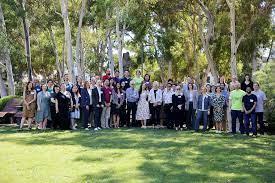
Hosted by the University’s Centre for Deliberative Democracy and Global Governance (CDDGG) the three-day event brought together postgraduate students and early career researchers with leading scholars in the field.
https://www.canberra.edu.au/about-uc/media/newsroom/2024/february/delibe...
The Summer School was founded by the Centre in 2015 and developed into an intercontinental collaboration co-hosted with Åbo Akademi University and the University of Turku in Finland. It is held every 18 months, alternating between Canberra and Europe, returning to Canberra for the first time since the COVID-19 pandemic.

“The summer school has given PhD students a valuable opportunity to present their work and form valuable connections with international researchers that will likely shape the future of their careers,” said Dr Hans Asenbaum, a Senior Research Fellow at the Centre and Summer School convenor.
One such student is Phoebe Quinn, a PhD candidate and research fellow at the University of Melbourne. Her doctoral research explores how democratic innovations can be used to crowdsource consensus on contentious issues around disasters and climate change. One of her supervisors is Professor Nicole Curato from the CDDGG.
“I had the chance to present some of my initial findings [in a panel session about digital democracy] that are part of my PhD, which enabled me to consider a whole range of questions from those attending the summer school, and to reflect on the implications for the next stage of my work,” Ms Quinn said.
“This event has been my first real opportunity to meet people researching democratic innovations from Australia and around the world, who are studying this area with a range of perspectives and methodological approaches.”
The presentations covered a wide range of topics, including deliberative systems, mini-publics, social movements, transnational deliberation, non-human deliberation and feminist and decolonial deliberation to name a few.
The postgraduate students and early career researchers who attended were also paired with mentors who offered advice on navigating academia and approaching the diverse field of deliberative democracy.
“Deliberative democracy is needed more than ever today. In the face of the crises of democracy, with populism and right-wing extremism on the rise, we need innovative and new ways of doing democracy,” Dr Asenbaum said.
The Summer School was capped with a celebration marking 10 years of the Centre for Deliberative Democracy and Global Governance at the University.
The celebrations continued this week with the Centre’s 10th Anniversary Symposium and will also be observed throughout the year during the CDDGG 10-year Anniversary Seminar series. The first seminar, How can deliberative democracy listen to nonhumans? is on 20 February.
Photo by David Beach.









